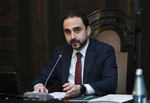Thursday, 10 December 2020
Interagency Commission on Prisoners of War, Hostages and Missing Persons Holds Meeting
On December 10, Deputy Prime Minister Tigran Avinyan chaired a meeting of the Interagency Commission on Prisoners of War, Hostages and Missing Persons.
Addressing those present, the Deputy Prime Minister said. “Today we will discuss in detail issues related to the ongoing negotiations on the exchange of prisoners, the work carried out to find the missing persons and the identification of victims’ bodies. I think there is no need to emphasize once again that these issues are high on the government’s agenda and that the involved agencies must act as quickly and flexibly as possible.
You may know that we have had some progress in the prisoner exchange process. Later yesterday (December 9), three Armenian civilian prisoners were transferred from Azerbaijan to Armenia through the mediation of Russian peacekeepers. Both the Armenian and Azerbaijani sides have already submitted the lists of prisoners to the International Committee of the Red Cross. A verification process is currently underway
We have proposed to apply the principle of “all for all” in the war prisoner exchange process, as well as to create a mechanism according to which in case of finding new prisoners, each of the parties undertakes to return them without preconditions. I should mention that everything possible is being done to speed up the exchange process as much as possible.
Today we will discuss legislative changes aimed at facilitating the ongoing activities. We will also address issues of increasing the efficiency of search operations, DNA research, psychological support and hotline operations.”
Ways to speed up the process of identifying victims’ bodies through DNA analysis were discussed during the meeting. The Ministry of Healthcare is going to procure another forensic genetic testing line to speed up the identification process.
The commission discussed in detail issues related to the provision of financial assistance to the families of missing servicemen, the development of psychological assistance programs and the introduction of psychological rehabilitation systems, as well as the possibility of conducting medical and social examination of persons without identification papers.
The Deputy Prime Minister gave relevant instructions to the relevant government departments on all the above-mentioned issues.










